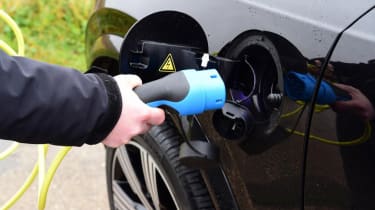All new petrol and diesel cars – including hybrids – are to be banned from sale by 2035, possibly as early as 2032
Concerns around the environmental impact of petrol and diesel cars have been mounting for years. Eventually it became inevitable that, at some point, dates would be set in countries around the world for vehicles using internal combustion engines to be banned from sale.
In 2017, a deadline was set for the UK to ban sales of all new petrol and diesel cars by 2040. Then, in 2020, the Government brought this date forward to 2035 and made the terms more strict. Predictably, these moves were controversial, prompting both praise and criticism from various groups.
Best electric cars to buy 2020
Here, we cover everything you need to know about the new petrol and diesel car sales ban in the UK, including when it’s happening and exactly which kinds of vehicles are affected.
When are new petrol and diesel cars being banned from sale?
Originally, the UK Government said new conventionally powered petrol and diesel cars would be banned from sale by 2040. Scotland, meanwhile, set itself an earlier deadline of 2032.
Early in 2020, though, the UK-wide plan was amended. Transport secretary Grant Shapps announced the ban would be brought forward to 2035 at the very latest, adding that the Government was consulting on implementing it as early as 2032.
Since then, pressure has been mounting from certain lobbies for this to happen. In June 2020, the Committee on Climate Change – an independent body that advises ministers on decarbonisation – asked the Government to provide “detailed policy arrangements” to enable the ban to come into force by 2032 “at the latest”.
Some car makers are reportedly less keen, though. According to the Financial Times, one manufacturer has told the Government that “restricting customer choice to expensive electric vehicles would result in less affluent customers being excluded from mobility, preventing the Government from achieving its levelling up agenda”.
Which vehicles will be affected by the ban?
Originally, only new conventionally powered petrol and diesel cars were to be banned from sale. This would mean that new hybrids could still be sold at car dealerships. This changed, however, when the Government announced the ban would be in place by 2035.
As it stands, all new cars with a petrol or diesel combustion engine fitted – regardless of whether they’re hybrids or not – will be banned from sale in the UK by 2035. This prompted some criticism from the industry. The Society of Motor Manufacturers and Traders said the move was “extremely concerning”, while the National Franchised Dealers Association urged the Government to “reconsider the benefits of plug-in hybrid vehicles”.
Auto Express understands that light commercial vehicles – vans weighing under 3.5 tonnes – will also be banned if they have any kind of petrol or diesel engine. This means only new pure electric vans like the Nissan e-NV200 will be allowed to remain on sale from 2035, which may come as a surprise to manufacturers who have developed plug-in hybrid vans, as Ford has done with the Transit PHEV.
UK electric car investment
The UK may be well-placed to take advantage of the 2035 ban, however. Only last year Jaguar Land Rover announced a £1billion investment in electric car manufacturing facilities in the UK, while the Nissan Leaf EV is built in Sunderland.
But the wider car industry has invested heavily in PHEVs – cars that typically emit as little as 50 grams per kilometre of carbon dioxide. The 2035 ban is also likely to make oil companies nervous – not least if it is adopted by other countries.
Your electric car questions answered – the ultimate EV and hybrid FAQ guide
On a practical scale, the switch to electric cars is not without hiccoughs. Concerns have already been raised about the ethical supply of metals like cobalt, as well as whether or not there are enough raw materials to build the batteries necessary for the mass adoption electric cars. The 2.3 million new cars sold in the UK in 2019, for example, are almost equivalent to the total number of EVs sold globally last year.
The UK’s charging infrastructure is another stumbling block, and while there have been a number of Government initiatives, such as greater investment in public chargers and wireless charging pilot schemes, no clear answers have been provided for how the millions of apartment dwellers, or those without off-street parking, will easily charge their EVs in the future.
The 2035 ban of all new cars aside from electric and hydrogen models will also raise concerns related to affordability. When it was first announced, the chief executive of the Society of Motor Manufacturers and Traders, Mike Hawes, said: “Look at what our best-sellers are: Fiesta, Corsa, and so forth. There isn’t an electric model that’s down in that price bracket…the price needs to come down, and then you can broaden the demand.”
The Transport Secretary, Grant Shapps, confirmed the ban would be moving forwards to 2035, saying: “This government’s £1.5bn strategy to make owning an electric vehicle as easy as possible is working – last year alone, a fully electric car was sold every 15 minutes. We want to go further than ever before. That’s why we are bringing forward our already ambitious target to end the sale of new petrol and diesel cars to tackle climate change and reduce emissions.”
London ULEZ: the Ultra Low Emissions Zone explained
Commenting on the bringing forward of the ban, Edmund King, AA president, said that while drivers “support measures to clean up air quality and reduce CO2 emissions”, he considered the new targets “incredibly challenging.” King said it was necessary to “question whether we will have a sufficient supply of a full cross section of zero emissions vehicles in less than fifteen years.
King concluded: “Manufacturers are also spending billions on developing state of the art hybrids which are zero emissions for many journeys but these will also be excluded from sale. This seems a very backward step that could backfire by encouraging drivers to hold onto older more polluting vehicles for longer.”
Mike Hawes, chief executive of the Society of Motor Manufacturers and Traders (SMMT) said it was “extremely concerning” that the government “has seemingly moved the goalposts for consumers and industry on such a critical issue.”
What kind of car should you buy today? We examine the petrol, diesel, electric and hybrid options here…
Source: Read Full Article



 Best electric cars to buy 2020
Best electric cars to buy 2020
 Your electric car questions answered – the ultimate EV and hybrid FAQ guide
Your electric car questions answered – the ultimate EV and hybrid FAQ guide London ULEZ: the Ultra Low Emissions Zone explained
London ULEZ: the Ultra Low Emissions Zone explained